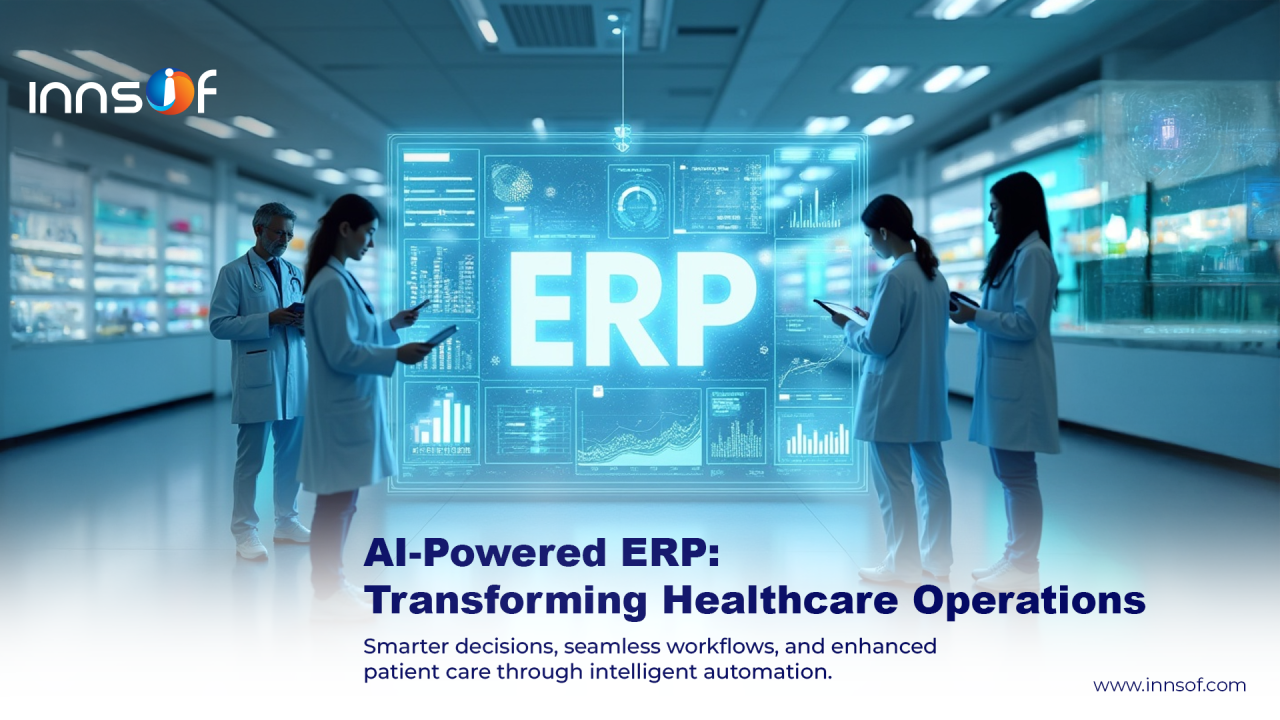AI-Powered ERP: Transforming Healthcare Operations

In today’s scenario maintaining quality patient care is difficult. Hospitals, Clinics and other health care centers are dealing with vast amounts of data every day. From patient records to billing, inventory management, staff scheduling, and compliance. By the emergence of AI powered healthcare systems, it is transforming the entire organization’s operations. By combining the robust functionalities of ERP with the intelligence of artificial intelligence, healthcare providers can unlock smarter, faster, and more efficient operations.
The Role of ERP in Healthcare
The ERP system integrates various processes like patient administration, supply chain, finance, human resources, and compliance into a centralized platform. This integration ensures seamless data flow across departments, eliminates redundancies, and improves overall transparency. However, traditional ERP solutions are often reactive — they manage data but lack predictive insights. This is where AI-driven innovations come into play.
1. Predictive Analytics for Patient Care
AI integrated into ERP systems can analyze real time as well as old medical records to predict health outcomes. For example, predictive models can identify patients at risk of readmission, enabling doctors to intervene early with preventive care. This not only improves patient outcomes but also reduces unnecessary costs for healthcare centers.
2. Smarter Resource Management
Healthcare facilities often struggle with managing resources like ICU beds, medical equipment, and staff availability. AI-powered ERP systems can forecast demand patterns based on patient inflow and historical data. For instance, during flu season, the system can predict increased patient admissions and ensure adequate staffing, medication stock, and bed availability.
3. Automation of Administrative Tasks
Administrative overhead is one of the major burdens in healthcare. AI-driven ERP helps in processing claims, it automates billing to avoid repetitiveness, appointment scheduling and insurance verification. By reducing manual interventions, health centers can save time, lower human errors, and focus more on delivering patient care.
4. Enhanced Decision-Making with Real-Time Insights
AI-enabled ERP platforms provide decision-makers with real-time dashboards and actionable insights. Hospital or clinic administrators can track KPIs such as patient satisfaction, bed occupancy rates, and treatment outcomes instantly. This ensures timely and data-driven decision-making for better healthcare delivery.
5. Supply Chain Optimization
Managing medical supplies is critical in healthcare. AI in ERP systems helps predict usage trends, avoid stockouts, and minimize wastage of perishable medical products. For example, the system can automatically alert procurement teams when essential drugs are running low or when equipment maintenance is due.
6. Improved Data Security & Compliance
Healthcare organizations must adhere to strict regulations such as HIPAA or GDPR. AI-enabled ERP platforms can monitor system access, detect unusual patterns, and ensure compliance through intelligent reporting. This adds a layer of security, protecting sensitive patient data from potential breaches.
Benefits for Healthcare Providers and Patients
The integration of AI with ERP systems doesn’t just optimize clinic or hospital operations — it directly impacts patient experience. Patients benefit from faster appointment scheduling, reduced wait times, accurate billing, and personalized care. On the other hand, healthcare providers enjoy streamlined workflows, reduced operational costs, and improved staff efficiency.
Future of AI in Healthcare ERP
As technology continues to advance, the role of AI in healthcare ERP will only grow stronger. Emerging innovations such as natural language processing (NLP) can help doctors and staff interact with ERP systems using voice commands, while machine learning models will continuously improve predictions with more data. Additionally, the integration of IoT devices with AI-powered ERP will enable real-time monitoring of patients, feeding live health metrics directly into healthcare systems for immediate action.
Conclusion
AI-powered ERP systems represent a game-changer for the healthcare industry. They not only enhance operational efficiency but also support proactive, patient-centered care. By embracing these innovations, healthcare providers can ensure better outcomes, reduce costs, and create a more sustainable healthcare ecosystem. In a world where data drives decisions, AI-integrated ERP systems are paving the way for a smarter and healthier future.

